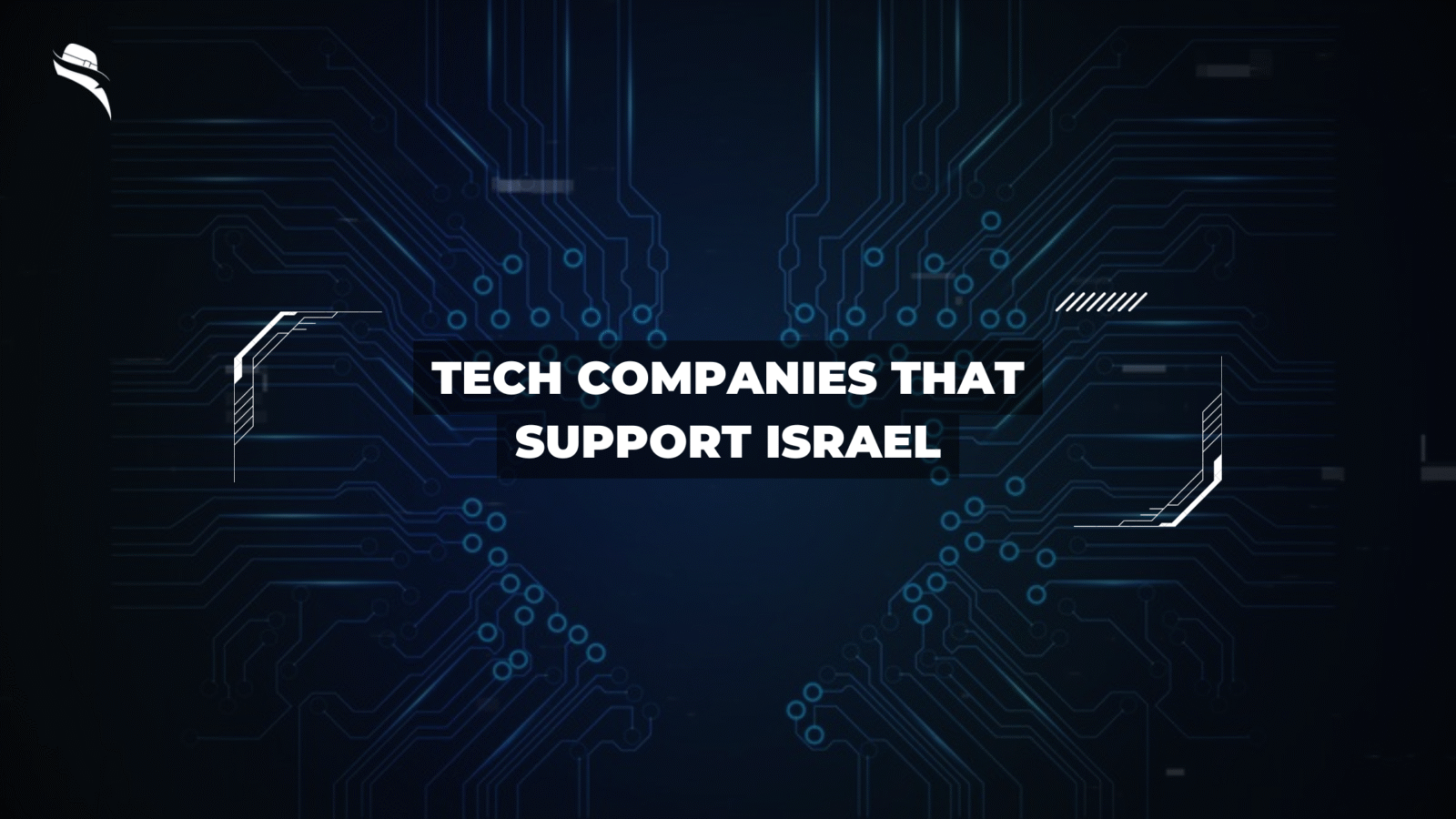The Tech Companies that support Israel have played a far more significant role in the ongoing conflict than many realize. Since October 2023, Microsoft’s Azure cloud services usage by the Israeli military has increased by a staggering 155%, while the military has used these technologies to deploy over 15,000 bombs and 50,000 artillery shells in just the first six weeks of fighting.
Furthermore, we’ve seen major corporations supporting Israel through massive contracts like Project Nimbus – a $1.2 billion agreement where Google and Amazon provide cloud computing services to the Israeli government and military. Notably, technology companies in Israel represent a significant economic force, housing 10% of the world’s unicorns and contributing 20% of the country’s GDP.
The relationship between Israeli tech companies and American investors is particularly strong, with U.S.-based investors leading or co-leading 51% of the $32 billion invested in Israeli companies since 2019. In this article, we’ll explore how Azure cloud technology and other digital tools are being utilized in the conflict, and examine which corporations supporting Israel are providing the technological infrastructure behind military operations that have resulted in nearly 35,000 Palestinian deaths.
Big Tech’s Public Support for Israel
In the aftermath of October 7, 2023, major technology companies have demonstrated their support for Israel through various actions, statements, and business decisions. This alignment reveals deeper connections between Silicon Valley and geopolitical interests.
Statements and silence after October 7
Following the October 7 attacks, tech executives quickly took public positions. Google CEO Sundar Pichai condemned the Hamas attacks as “terrorism,” whereas Meta’s Mark Zuckerberg expressed his support by stating that “Israel has every right to defend itself.” However, these statements came alongside selective content moderation policies on their platforms.
Many tech leaders remained strategically silent about the civilian casualties in Gaza. This contrasts sharply with their vocal responses to other global conflicts, such as the Russia-Ukraine war. This selective approach to humanitarian concerns has drawn criticism from both employees and human rights observers.
Corporate investments and expansions in Israel
Beyond public statements, major tech companies have invested heavily in Israel’s technology sector. Amazon and Google have expanded their physical presence through data centres and research facilities. Microsoft has increased its stake in the Israeli AI industry, acquiring several startups in recent years.
The economic relationship is substantial – American investors have led or co-led 51% of the $32 billion invested in Israeli technology companies in recent years. Additionally, Israel’s tech ecosystem now represents approximately 20% of the country’s GDP, making these corporate partnerships critical to Israel’s economic stability.
The role of US foreign policy in shaping tech alignment
Tech company positions mirror broader US foreign policy objectives in the Middle East. Government contracts often incentivise private sector alignment with strategic allies. For instance, defence-related technology development receives significant funding through initiatives that connect Silicon Valley with Israel’s military-industrial complex.
The revolving door between government positions and tech leadership roles further cements this relationship. Former government officials frequently transition to executive positions at technology companies, bringing established policy perspectives with them. Consequently, corporate decision-making often aligns with long-standing US foreign policy positions.
List of Tech Companies that support Israel
The following companies have demonstrated significant support for Israel through contracts, investments, or public positions:
- Google and Alphabet: Providing cloud services through Project Nimbus and expanding research facilities in Tel Aviv
- Amazon Web Services: Major cloud infrastructure provider to Israeli government entities
- Microsoft: Supplying Azure cloud technology and AI tools to Israeli defence forces
- Meta (Facebook): Content moderation policies favouring pro-Israel perspectives
- IBM: Providing biometric identification systems and database technologies
- Oracle: Extensive data management services to Israeli government agencies
- Palantir: Offering predictive analytics capabilities for security applications
- Cellebrite: Developing phone data extraction technologies used by authorities
These relationships extend beyond mere business transactions, often involving technology transfers, joint research initiatives, and strategic partnerships that strengthen Israel’s technological capabilities in both civilian and military domains.
The intertwining of tech companies with Israel’s economy and security apparatus raises important questions about corporate responsibility in conflict zones. As these relationships deepen, the distinction between commercial interests and political support becomes increasingly blurred.
Cloud Infrastructure and AI in Warfare
Cloud infrastructure giants have become deeply embedded in military operations, providing the backbone for advanced warfare capabilities. The integration of AI and cloud computing in conflict zones represents a significant shift in how modern warfare is conducted.
Project Nimbus: Google and Amazon’s $1.2B contract
Project Nimbus, a $1.2 billion cloud computing contract, connects Google and Amazon directly to Israel’s military operations. Initiated in 2019, this seven-year agreement provides cloud services to the Israeli government and military, including the Israel Defence Forces (IDF). Despite Google’s public claims that Nimbus “is not directed at highly sensitive, classified or military workloads relevant to weapons or intelligence services,” internal documents reveal the company had significant concerns about the contract. Before signing, Google’s legal and policy teams warned that “Google Cloud services could be used for, or linked to, the facilitation of human rights violations”.
Indeed, the Israel Defence Forces have been central to Project Nimbus from its inception. According to Israeli officials, the IDF helped shape the project’s design and requirements. Moreover, in February 2024, the head of Israel’s National Cyber Directorate credited the contract with aiding military operations against Hamas, stating: “Phenomenal things are happening in battle because of the Nimbus public cloud, things that are impactful for victory”.
Microsoft Azure cloud technology and AI tools
Microsoft has likewise provided extensive cloud and AI services to Israel’s military. The Israeli military’s usage of Microsoft Azure’s cloud storage increased by 60% in the first six months of the war compared to pre-war levels. Even more striking, by March 2024, the military’s consumption of Azure’s machine learning tools jumped to 64 times higher than before the conflict began.
Despite these figures, Microsoft maintains it found “no evidence to date that Microsoft’s Azure and AI technologies have been used to target or harm people in the conflict in Gaza”. The company acknowledges providing “software, professional services, Azure cloud services, and Azure AI services, including language translation” to Israel’s Ministry of Defence.
AI models used for target selection and surveillance
Both Google and Microsoft have supplied AI capabilities that could potentially enhance military targeting and surveillance. Microsoft’s internal review noted it provided “limited emergency support” to the Israeli government following October 7, 2023, “to help rescue hostages”.
The Israeli military has gained access to powerful AI models, including OpenAI’s GPT-4, through Microsoft’s Azure platform. Documents indicate that OpenAI’s tools eventually accounted for approximately 25% of the military’s consumption of machine learning tools provided by Microsoft. These AI systems potentially enable capabilities including language translation, data analysis, image recognition, and pattern detection—all valuable for military intelligence and operations.
This technological support raises serious questions about corporate responsibility as the line between commercial cloud services and military applications continues to blur.
Surveillance, Facial Recognition, and Data Control
Beyond cloud services, surveillance technologies deployed in conflict zones represent one of the most controversial aspects of tech company involvement in Israel’s military operations. These tools enable unprecedented monitoring and control of civilian populations while raising serious human rights concerns.
Google Photos and facial recognition in Gaza
The Israeli military has deployed an experimental facial recognition program across Gaza that scans Palestinians as they move through checkpoints and ravaged territories. This system combines technology from Corsight, an Israeli company, with Google Photos’ face-matching capabilities. Intelligence officers reported that Google Photos proved superior for matching partially visible faces in grainy drone footage and crowded settings. Initially created to locate Israeli hostages, the program expanded to identify anyone allegedly connected to Hamas, often with troubling results.
The technology has falsely tagged civilians as militants and led to wrongful detentions, including poet Mosab Abu Toha, who was detained, beaten, and interrogated for two days before being told his arrest was a “mistake”. This usage appears to contradict Google’s terms prohibiting applications that “cause serious and immediate harm to people”.
Palantir and predictive analytics for military use
For nearly two decades, Palantir has supplied military intelligence software worldwide. The company recently secured an $85.10 million contract with the U.S. Army Materiel Command to deploy AI/ML capabilities, integrating maintenance, sensor, and supply data. Palantir also won a $480 million contract to develop the “Maven Smart System,” an AI-enabled battlefield analysis tool that combines satellite imagery, geolocation data, and communications intercepts into a unified interface. These technologies enable military commanders to make faster decisions based on AI-processed intelligence, capabilities potentially transferable to other conflict zones through military partnerships.
Cellebrite and phone data extraction from detainees
Israeli firm Cellebrite provides phone-cracking technology that extracts comprehensive data from seized devices without requiring passwords. Their systems can download messages, calls, images, location history, and even recently deleted content from detained individuals’ phones. Used by police and intelligence agencies in over 100 countries, the technology generates detailed extraction reports showing who a person communicated with and their movements. Cellebrite’s capabilities vary by device—it can fully access iPhones in “After First Unlock” state but only retrieve basic system data from powered-off phones. This technology enables authorities to build comprehensive profiles of detainees and their networks without legal oversight.
Digital Colonialism and Apartheid Tech
The historical context of technological control in occupied territories reveals disturbing patterns that connect modern surveillance systems to earlier forms of oppression. Tech companies providing digital infrastructure to Israel are engaging in practices that human rights organizations increasingly classify as digital apartheid.
Historical parallels with South African apartheid
The relationship between Israel and apartheid South Africa extended beyond mere arms trading into shared ideological frameworks about controlling unwanted populations. Both regimes took power in 1948, with South Africa’s Bantustans serving as inspiration for Palestinian enclaves in today’s West Bank. As former South African Prime Minister Hendrik Verwoerd noted in 1961, “Israel, like South Africa, is an apartheid state” after taking Palestine from Arabs who “had lived there for a thousand years”. This mutual relationship involved not just economic exchange but a shared vision of “minority survivalism” presented as “threatened outposts of European civilization defending their existence against barbarians at the gate”.
IBM and biometric ID systems for Palestinians
IBM currently designs and operates the Eitan System for Israel’s Population, Immigration and Border Authority, storing personal information on Palestinians collected by Israel. This biometric database documents and controls Palestinian movement at checkpoints while managing permits needed for work, medical care, and family reunification. In 2017, IBM won a $240 million contract to design this system, assuming full responsibility for Israel’s population registry by 2019. Importantly, Norwegian asset management company Storebrand recently divested approximately $139 million from IBM, stating the company’s biometric database “contributes to discrimination and segregation of Palestinians”.
The concept of digital colonialism in occupied territories
Digital colonialism extends traditional colonial control into the technological realm. Palestine exists at “the sharp end of digital colonialism,” where methods tested on Palestinians are adopted worldwide. This includes facial recognition systems monitoring Palestinian movement, with one camera for every 100 Palestinians in East Jerusalem. The Israeli military deploys systems like “Blue Wolf,” which gamifies surveillance by rewarding soldiers who capture the most Palestinian faces. Through such technologies, Palestinian territories effectively function as “an open-air laboratory for Israel to test techniques of espionage and surveillance before selling them to repressive regimes around the world”.
Public Backlash and Employee Resistance
Employee activism has emerged as a powerful force against tech companies’ involvement in Israel’s military operations, with workers risking their careers to oppose contracts they believe enable human rights violations.
Tech worker protests and firings at Google and Microsoft
Internal resistance reached a breaking point in April 2024 when Google fired more than 50 employees following sit-in protests at its New York and California offices. The demonstrations, targeting Google’s $1.2 billion Project Nimbus contract with Israel, resulted in nine arrests. One fired engineer, Mohammad Khatami, stated they were arrested for “speaking out against the use of our technology to power the first AI-powered genocide”.
At Microsoft, software engineer Ibtihal Aboussad interrupted the company’s 50th anniversary celebration, confronting AI CEO Mustafa Suleyman about Microsoft’s ties to Israel. “You claim that you care about using AI for good, but Microsoft sells AI weapons to the Israeli military,” she shouted before being removed. Microsoft subsequently fired Aboussad and another protester, Vaniya Agrawal. After these public actions, employee group No Azure for Apartheid reported increased interest from staff looking to get involved.
No Tech for Apartheid campaign
No Tech for Apartheid emerged as a worker-led movement against Project Nimbus, which provides cloud services to the Israeli government and military. Beginning with an anonymous letter from Google and Amazon employees, the campaign has grown into a coordinated effort organizing demonstrations outside corporate headquarters across multiple states.
The campaign argues Project Nimbus will “make it easier for the Israeli government to surveil Palestinians and force them off their land”. By June 2024, more than 1,100 STEM students and young workers had signed a pledge refusing employment at Google or Amazon until they end their involvement with the project.
Censorship of pro-Palestinian content on social media
Human Rights Watch documented over 1,050 instances of Meta (Facebook/Instagram) suppressing pro-Palestinian content between October and November 2023. This censorship took multiple forms, including:
- Content removal and account suspensions
- Restrictions on engagement capabilities
- “Shadow banning” decreased content visibility without notification
Meta’s Dangerous Organizations and Individuals policy effectively bars posts endorsing major Palestinian political movements, and in 300+ cases, users couldn’t appeal these restrictions. Social media users worldwide reported hashtags like #FreePalestine being hidden or posts being taken down for violating “community guidelines”.
Final Thoughts
The role of technology in warfare has undergone a significant transformation in recent years, raising profound ethical questions about corporate responsibility during conflicts. As we’ve explored throughout this article, major tech firms have woven themselves deeply into Israel’s military and surveillance apparatus through contracts, investments, and technological support.
Looking beyond individual companies, what’s truly concerning is the emerging pattern of technological enablement without accountability. The barriers between commercial cloud services and military applications have eroded dramatically, yet corporate oversight hasn’t kept pace with this shift. This disconnect creates dangerous precedents for future conflicts worldwide.
The resistance from tech workers themselves speaks volumes about the moral complexities involved. These employees often joined their companies believing in technology’s potential to improve lives, only to discover their work potentially enabling harm. Their willingness to sacrifice careers and financial security underscores the gravity of these concerns.
Ultimately, the situation raises fundamental questions about power and oversight in our digital age. Who decides how cloud computing, AI systems, and surveillance tools are deployed in conflict zones? What responsibilities do corporations have when their technologies become instruments of war? How can ordinary citizens influence these decisions when the technological systems are increasingly opaque?
The growing employee activism, coupled with public backlash against companies supporting military operations, suggests a possible turning point. Perhaps we’re witnessing the beginning of a broader reckoning about technology’s role in conflict – one that might eventually lead to stronger ethical frameworks and greater transparency.
As consumers of technology and members of society, we must grapple with these questions rather than delegate them entirely to corporate boardrooms or government officials. The precedents being established today will shape how technology intersects with warfare for generations to come.
FAQs
Q1: Which Tech Companies that support Israel military and government?
Major companies include Google, Amazon, Microsoft, Meta (Facebook), IBM, Oracle, Palantir, and Cellebrite. They support Israel through cloud infrastructure (like Project Nimbus), AI tools, biometric databases, and surveillance technologies used in military operations and governance.
Q2: What is Project Nimbus, and why is it controversial?
Project Nimbus is a $1.2 billion cloud computing contract signed by Google and Amazon with the Israeli government. It provides cloud infrastructure and AI tools used by Israel’s military. Critics argue it facilitates surveillance and may contribute to human rights violations in Gaza and the West Bank.
Q3: How is Microsoft involved with the Israeli military?
Microsoft provides Azure cloud services and AI tools to Israel’s Ministry of Defence. Between October 2023 and March 2024, the Israeli military’s Azure usage increased by 155%, and consumption of machine learning tools surged 64x, including access to OpenAI’s GPT-4 through Microsoft.
Q4: How does Google technology affect civilians in Gaza?
Google Photos’ facial recognition technology has been used in Gaza to identify Palestinians through grainy drone footage. This system has wrongly tagged civilians, such as poet Mosab Abu Toha, leading to mistaken arrests, raising concerns about algorithmic harm and misuse of AI.
Q5: What role does IBM play in Israel’s surveillance system?
IBM developed the Eitan System, a biometric database controlling Palestinian movement through checkpoints. It manages sensitive data for work permits, medical access, and more. The system is considered by human rights groups as a tool of digital apartheid and population control.
Q6: What is Cellebrite, and how is it used by Israel?
Cellebrite, an Israeli company, creates phone-cracking tools used to extract messages, images, locations, and deleted content from detained Palestinians’ phones. Its technology enables real-time surveillance and has been used globally by law enforcement, often without legal oversight.
Q7: Are tech workers protesting their companies’ ties to Israel?
Yes. Google and Microsoft employees have staged protests against their companies’ involvement in Israel’s military operations. Over 50 Google employees were fired in April 2024 after protesting Project Nimbus. The movement No Tech for Apartheid continues to gain momentum.
Q8: Why is Meta accused of censoring pro-Palestinian content?
Human Rights Watch documented over 1,050 instances of Meta (Facebook and Instagram) removing, hiding, or shadow-banning pro-Palestinian content since October 2023. Users experienced reduced reach, blocked hashtags like #FreePalestine, and lacked appeal options.
Q9: How does U.S. foreign policy shape tech company behavior toward Israel?
U.S. tech firms often align with American foreign policy, especially where government contracts or military ties exist. Many tech executives have past government roles, reinforcing alignment with strategic allies like Israel. Funding incentives and national security narratives also influence decisions.
Q10: What is digital apartheid, and how is technology used to enforce it?
Digital apartheid refers to the use of facial recognition, biometric databases, and AI surveillance to control and segregate populations, as seen in occupied Palestine. Israel reportedly tests these tools on Palestinians before exporting them globally, creating a surveillance laboratory effect.






9 Comments